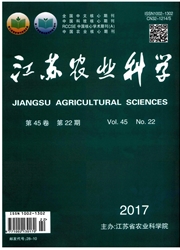

 中文摘要:
中文摘要:
芥子酶是一类降解硫代葡萄糖苷的酶,该基因表达具有组织特异性。研究表明,新型芥子酶TGG4和TGG5都是在根部表达。为了研究TGG4、TGG5的功能作用,提取了生态型拟南芥Col-0根部以及含有重组蛋白酵母的芥子酶,进行了酶活性条件测定以及对比分析。结果表明:根部芥子酶有更高的抗坏血酸激活浓度为2mmol/L;根部芥子酶同重组蛋白的最佳反应温度以及pH范围一致,在37℃,体系缓冲液pH4.5时,根部芥子酶活性测定效果最好;NaCl对根部芥子酶和重组蛋白芥子酶都有强烈抑制作用。因此推断根部芥子酶在耐盐碱、耐高温方面没有起作用,该酶也不能帮助根部抵御病虫侵袭,但是对根部的生长起到重要作用。
 英文摘要:
英文摘要:
Glucosinolate-myrosinase is a kind of enzymes that degrade glycosidase, the express of this gene is tissue-specific. Research showed that, the new myrosinase TGG4 and TGG5 are found in Arabidopsis thaliana root. In order to find the function of TGG4 and TGG5, we extracted the myrosinase from ecological Col-0 root and the yeast contained recombinant protein, determined the enzyme activity condition and analyzed the different. It suggested that, the root myrosinase need higher ascorbic acid active concentration, it was about 2 mmol/L, the best reaction temperature and pH range were the same, for root myrosinase, the temperature was 37℃, and the pH was 4.5, for all myrosinase the NaCl had a strong inhibition of effect. The author believed that, root myrosinase did not work in salinity and themostability, and the enzyme also could not help root against disease and insect attack, but it might be play an important role in root growth.
 同期刊论文项目
同期刊论文项目
 同项目期刊论文
同项目期刊论文
 期刊信息
期刊信息
